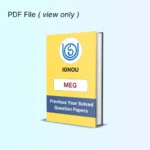MEG-10 Block 6 Summary | Questioning the ‘Canon’
- Last Updated On October 14, 2025
Table of Contents
Here you will get the detailed summary of IGNOU MEG 10 Block 6 – Questioning the ‘Canon’.
We have provided the summary of all units starting from unit 1 to unit 6.
Introduction
IGNOU MEG-10 Block 6 focuses on “Questioning the ‘Canon’”, a critical examination of how literary canons are formed, who decides what is “worthy” literature, and how traditional English studies have often excluded non-Western, marginalized, and non-dominant voices. The block interrogates the ideological foundations of the canon, the rise of English literature as a field, and the changing landscape of criticism and pedagogy in response to postcolonial, feminist, Marxist, and cultural theory. It also explores the crisis in English studies, the rise of theory, and student disengagement, offering ways to reimagine English literature as a more inclusive and responsive discipline.
Unit 1: Questioning the Canon, Ideology and Assumptions of the Canon
This unit introduces the concept of the literary canon—a body of texts traditionally considered to be of the highest literary value. It critically evaluates how the canon is constructed and whose values it reflects.
Key ideas include:
-
The canon as ideological, shaped by class, race, gender, and colonial power structures.
-
The assumption of universality in canonical texts, which often marginalizes voices from the Global South, women, and minority communities.
-
The need to deconstruct the canon, not by rejecting classics outright, but by re-evaluating their cultural and historical contexts.
The unit emphasizes the importance of critical pedagogy, which questions authority and encourages students to engage with literature politically and contextually.
Unit 2: The Rise of English and Issues Concerning the Canon
This unit traces the historical rise of English literature as an academic discipline, especially in the context of colonialism and imperial education. It explores how the English canon was exported as a tool of cultural control in colonial territories.
Highlights:
-
English literature emerged as a moral and civilizing subject, particularly in 19th-century Britain.
-
In colonial India, it functioned as a way to create obedient, Anglicised elites.
-
The canon privileged male, European, white authors, excluding others as non-literary or less valuable.
The unit calls for a re-examination of literary value, proposing that inclusivity and contextual understanding be key to any modern syllabus.
Unit 3: Possibilities of New Agreements
This unit explores alternatives to traditional canon-making by proposing new ways of literary inclusion and assessment. It suggests moving toward dialogic, democratic, and pluralistic frameworks for evaluating literature.
Key points include:
-
Opening the canon to include postcolonial, Dalit, feminist, queer, and indigenous texts.
-
Encouraging comparative and interdisciplinary approaches that transcend national and linguistic boundaries.
-
Shifting from text-based hierarchies to context-sensitive teaching, where literary texts are studied alongside history, culture, and politics.
The unit envisions a literary landscape where diversity is not only represented but also critically engaged with on equal terms.
Unit 4: Exploding English – Criticism, Theory, and Culture
This unit looks at how the rise of literary theory and cultural studies has reshaped English studies. “Exploding English” refers to the way traditional definitions of English literature have been challenged and expanded by theory.
Themes explored:
-
The shift from close reading and literary appreciation to theoretical frameworks like Marxism, feminism, psychoanalysis, and poststructuralism.
-
Inclusion of popular culture, media, and non-literary texts into literary studies.
-
Resistance from traditionalists, who argue that theory has “complicated” or “destroyed” literature.
The unit shows how theory has enabled critical engagement with ideology, made visible power structures in texts, and opened new frontiers for scholarship.
Unit 5: The Crisis in English Studies
This unit examines the so-called “crisis” in English departments, which includes declining student interest, confusion over curriculum content, and uncertainty about the subject’s relevance.
Important concerns:
-
Overwhelming curriculum diversity, making it hard to establish core texts or themes.
-
Growing disconnect between teacher expertise and student needs.
-
English’s status as a job-oriented or elite subject versus its academic depth and critique function.
The unit suggests that English studies must become more relevant, socially responsive, and critically engaged with student realities to stay meaningful.
Unit 6: Resistance to Reading and the Question of Material Base
The final unit addresses student disengagement and “resistance to reading”, especially in under-resourced and multilingual contexts. It relates this issue to material conditions—such as poor infrastructure, language barriers, and lack of relatable content.
Key discussions include:
-
Socio-economic inequalities affecting student readiness and motivation.
-
Linguistic alienation, as many students struggle with reading English texts fluently.
-
The need for pedagogical reform that includes translation, bilingual teaching, and materials contextualized to Indian realities.
The unit argues that English studies must become accessible and empowering, rather than alienating, by acknowledging the material base of learners and adapting content and methods accordingly.
